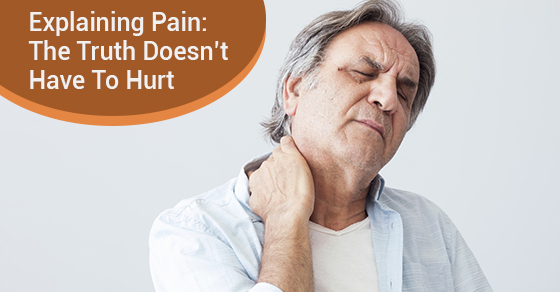
Explaining Pain: The Truth doesn’t have to Hurt
By: Jason Gallant, Registered Physiotherapist
We all experience pain, in one form or another, on a daily basis. It’s part of what makes us human and essential for our survival. What most people don’t know is that pain can take multiple forms and affect people in many different ways. The basic science of pain is this: our body senses a stimulus. That impulse is sent to our brain to determine whether that stimulus is within our normal threshold of sensory input (normal, everyday sensations), or if it potentially dangerous. If it’s outside this threshold, the impulse is sent back to the affected area and we experience pain (think stubbing your toe). This is all done subconsciously, without us having a chance to think about it.
What many people don’t realize is that there are many other factors, besides purely physical, that affect our perception of pain. If pain were purely physical, we would all be better in the usual time frame it takes for injuries to heal. But this is often not the case. Since the brain controls our perception of pain, there is a big mental aspect to it as well.
A good example of this is stress. Not simply physical stress on our bodies, but stress at home, at work, in our relationships. Studies have shown that if our stress levels are elevated, we can have a heightened sensitivity to pain. Other factors such as poor general health, lack of sleep, and decreased social interaction can all have an effect on our pain.
Your environment can also play a role in your pain. Sitting at a poorly designed workstation or doing repetitive physical work all day can affect your pain levels and increase your chances of having chronic pain.
Our individual coping mechanisms also have an affect on our pain. Some people have an avoidance strategy where they avoid anything that causes pain. This is ok in the short term, but if it persists it can lead to chronic pain. By continuing to avoid certain movements and activities you become sensitized to them, which can end up triggering your pain. Continually avoiding activities can lead possibly lead to social withdrawal and depression, furthering your sensitivity to pain.
There are others who cope with pain by trying to constantly push through it (“no pain, no gain”). Again, this strategy can be beneficial in the short term as it allows us to continue with our daily routine, but it can lead to chronic pain if we’re never giving our body a break to allow it to heal.
So what can a person suffering from chronic pain do to help themselves? Do something! Pain, at its most primitive level, is meant to cause a change in us. If we try to maintain the status quo, chances are our pain will stay the same as well.
The first step is educating yourself about pain. A good health care practitioner should be able to analyze all the different aspects of pain that are relevant to you, and what changes need to be made. Studies show that simply knowing more about your pain and what causes it can help decrease it.
Don’t focus on the purely physical aspects of your pain. Your neck hurts, you get a massage therapy, it should feel better, right? But what if it doesn’t? Are you having a lot of stress at your job? Are you sitting at an uncomfortable desk all day? Have you been sleeping, eating, exercising well lately? Have you stopped everything because you’re scared it will hurt your neck, or are you just pushing through the pain, thinking it will get better? All of these factors need to be considered.
A good health care practitioner can help you determine the difference between Hurt vs Harm. This means finding the right balance of physical stress to put on your body, and knowing when to work through pain, and when to back off. Pain does not always equal damage to our body. Knowing this will help us build up our pain tolerance and help to desensitize our body in a safe way.
Finally, an important step to understanding and relieving pain is knowing you can do something about it. Humans are resilient and dynamic creatures. We are designed to be able to adapt to the stress we put on our body and become more resilient to it. You HAVE the ability to change your pain, sometimes you just need to be pointed in the right direction. Knowing this is the first step in the recovery process. For those seeking alternative approaches to pain management and overall well-being, exploring services such as acupuncture in Toronto can provide valuable insights and potential relief.
 0 Comment
0 Comment 




Leave A Comment